Volcanoes

Mount Vesuvius and other volcanoes of the world
by Ben Snowden
 Mount Vesuvius' 1944 eruption Other Volcanoes
More Volcano Information
External Links
|
One of the most fascinating, if tragic, natural disasters of the last two thousand years occurred on August 24, 79 A.D. On this day, Mount Vesuvius (located near Naples, Italy) erupted, engulfing the nearby cities of Pompeii and Herculaneum in a tremendous flow of cinder, ashes, and mud.
Those inhabitants foolish enough to have remained in town at the time of the eruption were buried in this pyroclastic flow until the remains of Pompeii were discovered, almost perfectly preserved, in 1748.
The cinders and ashes that buried the town also kept it surprisingly intact, down to the fresh colors in wall paintings. Sporadically excavated over the past 250 years, Pompeii has provided a wealth of knowledge about ancient Roman civilization.
Almost Same Day, Almost Same Results
Eighteen hundred four years—almost to the day—after Pompeii was buried, an even larger volcanic catastrophe occurred half a world away. On Aug. 26–28, 1883, Krakatau, between the Indonesian islands of Sumatra and Java, erupted, destroying two-thirds of the island and discharging an immense cloud of dust that spread across the Earth, lowering global temperature by as much as 1.2 degrees C the following year.
Krakatau's explosions also produced forty-meter high tsunamis that hurled ashore pieces of coral weighing 600 tons, and whose residual waves were observed as far away as Cape Horn and England. More than 36,000 people died in the disaster.
Still a Threat
Like Vesuvius (which also erupted in 1872, 1906, and 1944, as well as several other times), Krakatau is still active; stirrings were recorded as recently as April 1996. And there are hundreds of other active volcanoes worldwide (Indonesia alone has 130). Many of these are submarine volcanoes whose activity goes undetected, but more than 500 volcanoes have had significant eruptions in recorded history.
- More Disasters!







